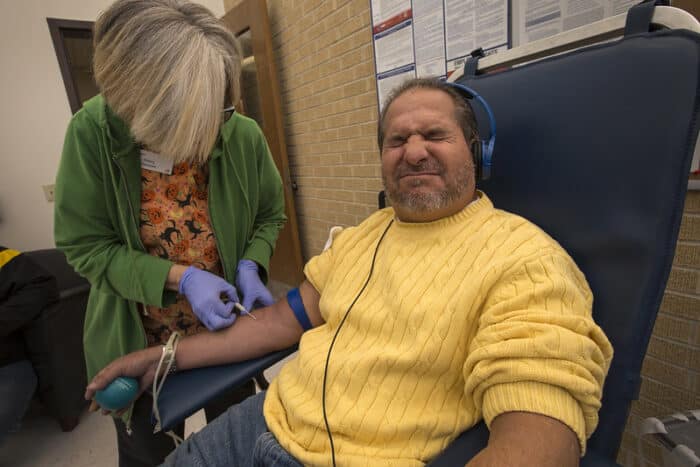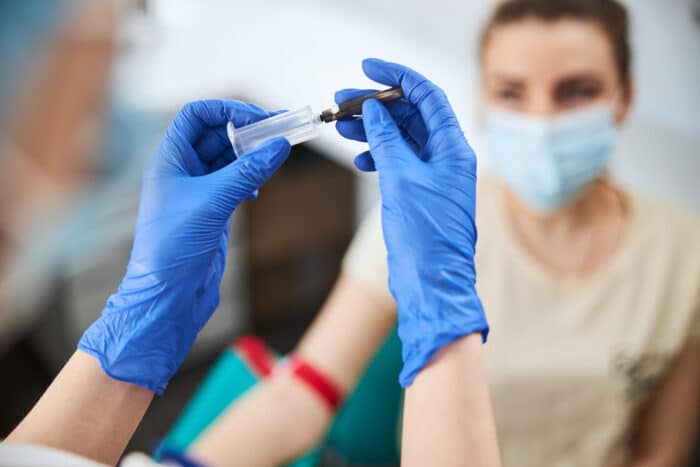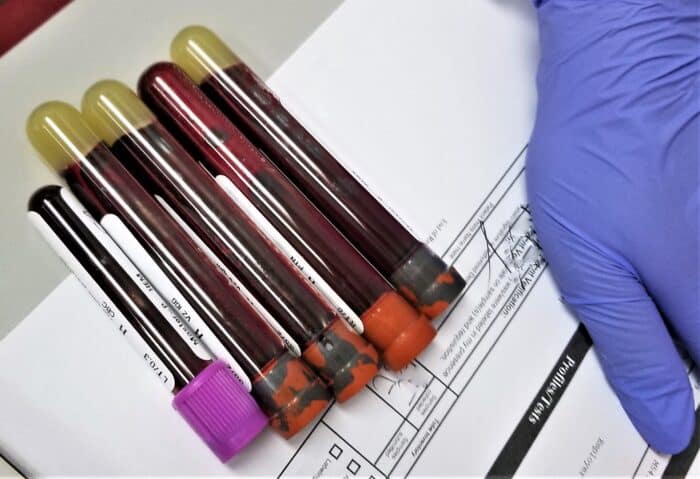Have you ever wondered where phlebotomists work?
Or if you’re an aspiring phlebotomist, are you curious about the types of work settings you can work in?
If yes, we’ve got you covered.
We will uncover, via this article, the different environments where you can find these unsung heroes working, and if you’re a phlebotomist with no experience, the options you have.
So, let’s get started!
Where Can Phlebotomists Work?
Phlebotomists usually work in a diverse range of healthcare environments, ranging from a hospital to pharmaceutical organizations.
Let’s take a detailed look at where phlebotomists can work:
1. Hospitals and Medical Centers:
Phlebotomists can be commonly found working in hospitals. They collect blood samples from patients and take them to the lab. Hospitals are generally busy, and hence phlebotomists working here have to manage time well in addition to being able to multitask.
2. Clinical Laboratories:
Phlebotomists also work in labs in hospitals or private practices. They take blood samples and work with other medical experts.
3. Blood Donation Centers:
Phlebotomists can also be seen working at blood donation centers or blood camps, wherein they collect blood from people who want to donate. These centers can be on their own or with hospitals.
4. Nursing Homes:
Phlebotomists assist old or sick people in places where they live. This can include nursing homes and long-term care facilities, where their main job is to comfort the patients while collecting their blood.
5. Physician’s Offices and Clinics:
Phlebotomists in small clinics can be found collecting blood from patients during regular visits. This is more personal and not as scary as big hospitals.
6. Research Institutions:
Phlebotomists help with research by collecting blood from people who have taken part in studies.
7. Mobile Phlebotomy Services:
Some phlebotomists visit people’s homes to collect blood, especially if they are unable to visit a hospital. This helps people who are sick or can’t move easily.
8. Pharmaceutical Companies:
Phlebotomists help in drug research by taking blood for various types of tests. They can also work with pharmaceutical companies, that make medicines.
9. Training:
Experienced phlebotomists can become teachers. They show new students and healthcare workers how to take blood correctly.
Read: How to Become a Phlebotomist

Do You Want To Become a Phlebotomist? Check Out Free Phlebotomist Masterclass!
In our masterclass you learn:
- How to be a Phlebotomist faster…in just 2 months!
- Avoid student debt & driving to classes
- #1 thing employers want from Phlebotomists
- How to stand-apart & get a university certificate for a strong resume
Where Can You Work as a Phlebotomist With No Experience?
Although many entry-level positions for phlebotomists may not require certifications, prior experience, or extensive schooling, the minimum requirement is a high school diploma or GED.
One efficient way to get a sense of what being a phlebotomist entails is through an externship program. Externships usually involve aspiring phlebotomists shadowing experienced professionals and can last from a few days to a few weeks. This provides valuable insight into the daily tasks and responsibilities of the job.
Externships offer the opportunity not only to connect with potential employers in the field but also to gain a firsthand understanding of the life of a phlebotomist. Furthermore, they allow you to demonstrate your enthusiasm and strong work ethic for the profession.
Where to Find Phlebotomy Jobs with No Experience or Certification
There are various job boards that frequently list openings for entry-level phlebotomists without experience or certification.
You can begin your search by using terms like “phlebotomy no experience” in the search bar to refine your results.
While many websites advertise jobs for novice or aspiring phlebotomists, here are some of the top job sites with the most listings that you can explore:
– Indeed
– Monster.com
– ZipRecruiter
– SimplyHired
Keep in mind that not all job postings will explicitly state “no experience required.”
Some may use terms like “no certification required” or “entry-level phlebotomist.”
Another useful approach is to regularly check the websites of local clinics and hospitals for job postings.
Consider visiting potential job sites such as nearby clinics or hospitals in person. This is especially effective when you lack experience, as it allows you to personally submit your resume and introduce yourself, making you more noticeable to potential employers.
Thoroughly Review the Job Description
Before applying for any position, it’s always suggested to carefully read through the job description to understand the requirements.
Typical prerequisites for phlebotomists with little to no experience often include a high school diploma, strong interpersonal and organizational skills, and a solid work ethic.
Working as a phlebotomist usually involves a fast-paced environment and multitasking abilities. Given that phlebotomists handle both clinical and administrative tasks, they may need to be on their feet for extended periods.
Also see: Phlebotomist Skills
Look for Positions Offering On-The-Job Training
Some employers may hire phlebotomists who are certified, but if you lack certification or experience, consider reaching out to healthcare facilities. Certain employers offer on-the-job training opportunities, with the expectation that phlebotomists will pursue certification after completing training.
Larger hospitals and clinics often provide internship programs for aspiring phlebotomists. These internships may offer a stipend during training, and successful completion might lead to incentives or raises.
Completing an externship can be advantageous, as many employers count internship hours as work experience.
For example, a year-long internship could count as one year of work experience.
Enhance Your Resume
Engaging in volunteer work related to healthcare can significantly enhance your application. Volunteering demonstrates your dedication and contributes to your community involvement.
Volunteer experiences often involve interacting with individuals in need, mirroring the interactions of a phlebotomist. This experience can increase your chances of being hired.
You can also explore volunteering opportunities in clinics or hospitals, which could open doors for future employment in similar settings.
While volunteering, monitor job listings for phlebotomists to ensure you fulfill all the specified requirements before applying for positions.
Conclusion
Phlebotomists can work in various healthcare settings, from hospitals and clinics to laboratories and blood donation centers. They play a crucial role in the healthcare system by drawing blood, ensuring patient comfort, and maintaining the integrity of blood samples.
Whether you prefer a fast-paced hospital environment, a quieter clinic, or the rewarding experience of helping blood donors, there’s a place for you as a phlebotomist. So, if you’re considering a career in healthcare that doesn’t require years of schooling, phlebotomy might just be the perfect fit for you.
Additional Sources:
- How Long Does it Take to Become a Phlebotomist
- Phlebotomist Certification
- Day in the Life of a Phlebotomist
- How To Choose Phlebotomist Classes Online?
- What is the Difference Between a Licensed Phlebotomist and Certified Phlebotomist?
- Which Two Skills are Important for a Phlebotomist?
- What Do You Need To Be a Phlebotomist?
- Phlebotomist Degree
- Phlebotomy Externship
- Mobile Phlebotomist
- What Jobs Can I Get With a Phlebotomy Certificate?
- Phlebotomist Cover Letter
- Is a Phlebotomist a Nurse?
- Therapeutic Phlebotomy
- Phlebotomy Course
- Phlebotomist School
- EKG Phlebotomy Technician
- Order of Draw Phlebotomy
- Phlebotomy Internship
- 4-Week Phlebotomy Classes Online
Related Articles
-
How to Be Successful in College in 2022 – 7 Simple Tips to Succeed
-
How Do Scholarships Work? Read This First…Truth is Shocking
-
7 Best College Majors 2024: What Should I Major In?
-
How to Choose a College – 10 Things You Must Consider in 2024
-
Why Go to College? Top 13 Benefits for Adult Students in 2022
-
Top 5 Best Alternatives to Community College for 2024







